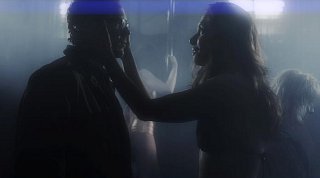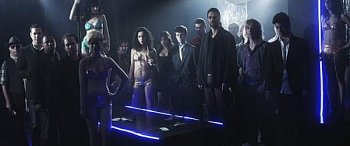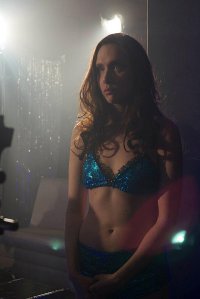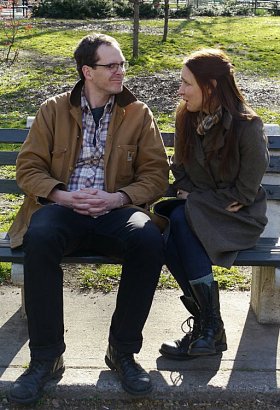|
Your new movie The
Days God Slept - in a few words, what is it about?
Jeremiah
Kipp: It’s
a boy meets girl story that seems to be set in an otherworldly strip club.
The boy wants to get to know her better, and she tells him her
story. As he presses her to tell him “how it really was” we start to
get the feeling he’s opening a Pandora’s box. The more we learn about
someone, the more mysterious they become.
Joe Fiorillo: I
think ultimately it's a very specific story about love in all its
contradictions, joys and pain. But in this case, love pushes on the
outer edges of extremity and tests in limits and its frailty.
How
did the project come together in the first place? And related to that, how
did you two first hook up?
Jeremiah:
Joe and I are part of a workshop for writers called Present Tense
Productions, run by a teacher named Mick Casale. Joe and I were both
doing an "advanced workshop" where we were working on scripts
and turning in rewrites at an incredibly rapid pace over the course of
three months. It was a kind of boot camp for the
playwright/screenwriter. Since we were both on the same regiment, it was a
way for us to connect as artists and, eventually, as friends. It must have
been a few years later that I first heard a reading of The
Days God Slept,
before I was attached as a director. It was material I responded to,
and I'd meet with Joe to talk about it without knowing it was all leading
to this collaboration.
Joe:
For a long time there, the script was kind of an experiment in using
non-literal storytelling style. I wasn't thinking about it ever
being shot. Jeremiah and I talked about the script many times from a
writing perspective. And at some point there it seemed like a good
idea to actually film it. Once I was serious about shooting it, I
asked Jeremiah if he'd want to direct it. I remember thinking that
he has the appropriate amount of angst needed to direct this script.
I think that was a sound judgment.

"You look like a dentist in
those glasses." |
Joe, what were your inspirations when writing The
Days God Slept? Joe:
I was in Miami and I met someone hours before I had to leave. She told
me a lot of things about herself. I think part of the allure of the
situation was that it was by its nature very ephemeral. When I went
to say goodbye to her, she said to me "You look like a dentist in
those glasses." For some reason, that particular line stuck
with me and wouldn't let go. What was your collaboration like
prior to and during the shoot, and Joe, what was it like to see your vision realized by someone
else? Joe:
I feel like I was very fortunate to work with Jeremiah on this. It
was a collaboration in the best sense of the word. We were talking
about this exact thing just the other day. And I quoted Pete
Townsend. Townsend said that he was very lucky to have Roger
Daltrey, because his lyrics were kind of dreary but Daltrey has a voice
like a razor blade. I think that there was a similar counterbalance.
The script has this strange sexuality juxtaposed a lot of religious
voiceover and ideation. Because Jeremiah and our director of
photography Dominick Sivilli make the film so visually striking, the
audience absorbs these difficult contrasting images. Jeremiah, how would you describe your directorial
approach to the story at hand?
|

|
Jeremiah: The world
is a very aggressive place, so our storytelling is aggressive too. Within the strip club, we wanted to create a kind of weird haven
where these two lost souls could try to connect. The safety of the movie
starts to erode. We created an intensely charged atmosphere for the
actors, who were tenacious and willing to go there. I’m grateful to have
a cinematographer like Dominick who is responsive to actors and
environment, who also throws himself into the world of the movie. I’d
also like to add that empathy for all the characters, and all the people
involved, is key. There were some wonderful actresses playing strippers,
and it was important that they not feel ashamed or exploited by the
experience—but instead to feel like beautiful creatures. One
of them, my friend Kelly Rae LeGault [Kelly
Rae LeGault interview - click here], arrived on set and saw the stripper
pole and thought to herself, “What the hell have I gotten myself
into?” But by the end of the day, if you asked her
what she became involved in, she responded, “Something wonderful…”
That means a lot to me, and translates into the work.
The
Days God Slept is quite labyrinthine in structure and plays with
different layers of reality. So did you ever run the danger of simply,
well, losing the plot, both during writing and filming?
Joe:
In a way, the plot and structure are actually very simple. It's more
the style that is problematic. I was pretty immersed in the world of
the script when I was writing it, so I never got lost really. But I
was very concerned about whether an audience would follow along with us.
That was the concern at every step of the way from the writing
through the editing process.
Jeremiah: I created a map for myself, with the various levels of
reality. The strip club was one level, let's call it a beautiful fantasia.
Then in the park scene you take a level down to earth, in what we
might describe as naturalistic reality. Beyond that were distorted
memories and flashbacks, which were diseased half-remembered reality.
Dominick and I even talked about using long lenses for the flashbacks,
mid-range lenses for the park and a mix of very wide and very long lenses
for the club, just so each felt a little different. It was like planning
the architecture of a house. I feel like the best experimental films are,
at their core, very straightforward. Samuel Beckett's avant-garde plays
were very specific to him, which is why they resonate today. I'm not
trying to compare us with the master, but merely by way of example.
What
can you tell us about your key cast, and why exactly these people?
|

Lauren Fox |
Jeremiah:
Talk about diseased memories... I seem to recall Lauren Fox being already
attached to the project before I came on! It was a little like the
scene in Mulholland Drive where the producers put the headshot on the
table and say, unquestioningly, "This is the girl!" Joe
remembers it a little differently. We joke about it now.
Joe: Yeah,
actually; Lauren wasn't quite attached yet. Jeremiah and I had
actually started to ask the question about who might we cast. He
didn't know Lauren at all. I said I had someone in mind. I
wasn't really sure if Lauren would want to do it. It's a really
demanding role and it asks an enormous amount of the actress. But I
had asked her to do a reading of it in a workshop -- at the time, the
material was getting mixed responses and I wasn't even sure she'd want to
read for it. But I had an intuition that she might respond to the
material. And then she read for it and wanted to do it. It was
very clear immediately that she was the right person for the part.
Jeremiah: After hearing Lauren read, and shooting a crowd-funding
promo together, I was absolutely convinced she was the only person who
could play Kristy. You feel a sense of history in her performance; a kind
of strength that comes from being deeply wounded. It felt so honest, so
damned committed and unflinching. We had a wonderful time collaborating on
this role; she's a great and fierce talent.

Malcolm Madera, Lauren Fox |
Joe:
Lauren
is utterly fearless in the role. As I said, the character is very
demanding and it takes not only a strong actress, but a strong person to
play it. I can't imagine anyone else in the role. Lauren is
terrific.
Jeremiah: The role of John was tricky to cast because he could so
easily slip into passivity. We saw different actors for the role and
landed upon Malcolm Madera, who I'd seen in a play and who had worked with
Lauren Fox. Once his name came up, it had to be him. Malcolm is no
pushover. He was going to get in there and fight for his right for this
character to exist. Interestingly, one of the keys for him to find the
character was wearing Joe's glasses. It hooked him into the part. While I
don't think this script is autobiographical, it's certainly personal.
Joe:
The trap of the script and the film is if John comes off as weak. We
had to find someone strong enough to portray unconditional love as a point
of character. Malcolm portrays that sort of natural inner strength.
He plays John in a precise understated way that balances the
character.
Jeremiah: We could go on and on about the cast; they were a
terrific group to work with. I can’t leave off without mentioning
the remarkable Lukas Hassel, an old friend and familiar, who plays Carl.
On the page, the role seems quite small, but he’s a powerful force that
the other characters are up against. I hadn’t initially thought about
Lukas, since he usually plays handsome and dashing romantic leads. But
Lukas is in touch with the darker sides of himself; he’s also a writer
and his script Le Mecano has been making the rounds and winning top
prizes at places like Cinestory. That script is full of bleak anguish and
terrifying nights of the soul. Lukas understands that place. I told him my
great fear that he was too beautiful for the role; so he tapped into the
ugly and subterranean parts of himself that he comprehends so well.
I loved what he built, and he’s one of those people I want to work with
again as soon as possible.
Joe: We
thought of Lukas late in the process because of the darkness of the
character. I've known Lukas for a long time and he was also really
helpful to me while the script was in the developmental process. He
had given me a lot of notes and encouragement. And he brought that
depth of understanding to the character. He does some things that
aren't in the script that are really instrumental in conveying the story
to the audience. He was enormously prepared and committed to the
performance. His performance is seamless.
Do
talk about your main location, the gentleman's club, for a bit if you may!
Jeremiah:
Amazingly, this film was shot in a raw space and the gentleman's club was
built entirely from scratch! I can only credit this to our superb
production designer Kimberly Matela, who made this location out of thin
air on a very meager budget. But I think your question is driving more to
the symbolism of the club...
Joe:
The club represents a kind of idealized sexuality where everything is
'blue lights and pretty costumes' as Kristy says in the film. The
club represents the state of mind of the characters and as that idealized
sexuality starts to break down, so does the metaphysics of the club.
What
can you tell us about the shoot as such, and the on-set atmosphere? Jeremiah:
It was a very fast and furious two day shoot, with the constant feeling of
being on the move. We had an excellent crew that I’d
worked with many times before, and that enabled us to be a brisk and
resilient gang of thieves. And as I recall, we shot the movie on Easter
weekend, which may have informed our work somehow.
Joe: Seeing the script become three dimensions was a very strange
experience for me. The script takes place in a really strange world
and there's a certain degree of uncertainty of how it will ultimately
translate. One of the really great things about the shoot was that people
really had fun—especially the extras. It had the feel of a real
party but when it got down to the shooting, everybody responded to their
parts. It was kind of amazing. I knew a lot of the extras and
they had never been on set before, but were really into it. Jeremiah
ran the set wonderfully in keeping that balance between having fun and
taking their roles seriously.
Jeremiah: The longer process was post-production, which lasted for
a year. We had Anthony Moran and Patrick McGowan in the
editing room, Roman Chimienti and Jay Pellizzi on sound design and mixing,
Dominick Sivilli color correcting the images and Harry Manfredini
composing the score. Again, it’s that feeling of
having a Mission: Impossible team working with you, only post feels closer
to the experience of writing. You are, in a sense, re-writing the
narrative and the feelings you want to create, and it was wonderful having
Joe there during every step of that process. The writer isn’t usually as
involved in post, and he was very willing to move and shape the material,
make cuts, changes—he wasn’t precious about the script. When I told
Dominick that, the response was, “Of course not. Joe’s a real
writer.” He understood that, in fact, we’re writing
up to the very end.
|

|
As
far as I know, The Days
God Slept has so far been seen by only a handful of critics - so
what can you tell us about critical reception so far? Jeremiah:
People come back with different interpretations. One of my favorites was
someone saying it was a metaphor for heaven, hell and purgatory, with Carl
as the devil, John as man, and Kristy as a fallen angel. When you
finish a film, it no longer belongs to you. It belongs to the audience.
When they respond to it, you hear the movie told back to you in a new way,
and you get to hear the movie they saw. So
when and where will the film be released onto the general public? Jeremiah:
We’re doing a NYC screening for cast, crew and friends on May 20 at
Anthology Film Archives, to be followed by the film festival circuit.
Ultimately, we hope everyone has the chance to see it.
Joe,
you are mainly known as a playwright - so how does writing for the screen
compare to writing for the stage, and will you ever be tempted to write
another screenplay? Joe: There's a lot you can do on
film that you can't really do in a play. You can jump locations or
time instantly. You can juxtapose voiceover against a contrasting
visual image which creates a new meaning for it. And you can induce
a feeling by the images you use. It's about communicating in a
different way. The stage plays I've written are all comedies. For
me, film seems a better medium for darker storytelling. I've already
written another film short. And I definitely plan on writing a
feature for my next large project. The process of filmmaking was so
much fun that I want to do it again. Jeremiah, since I've covered In
Fear of - Season 2 to quite some extent, you just have to talk about
your contribution to that one for a bit?
Jeremiah: I
only did one episode for season two, which has been shot and ready to go
into post-production. It’s about the fear of blindness, and Susan
Adriensen [Susan Adriensen
interview - click here] (from Alan Rowe Kelly’s The Blood Shed
[Alan Rowe Kelly interview -
click here]) plays our main
character, who is confronting her illness head-on. It’s not a soft
story. It’s about drugs, shrieking mayhem, psychological assaults,
exorcisms, confrontations. In some ways it felt like a recap of other work
I’ve done. Susan was just wonderful, and we’ll see how it all turns
out. Any future projects
you'd like to share? Jeremiah: Working with Joe and
our producer Lauren Rayner was a deeply satisfying experience. We’re currently developing a new project together which promises
to be an unnerving psychological horror film. It’s more of a
straightforward genre film than The Days
God Slept. Joe and I were
interested in making something—not more mainstream, but certainly more
narrative-driven.
Joe: I wrote a short film called The Minions.
It came from a
suggestion from Jeremiah. Someone was looking to produce a short and
Jeremiah called me and asked if I could write something quick. He
suggested I adapt a particular part of a short story I had written. At
the time, I wasn't sure about it but I found a way to change the material
substantially to make it work as a short film. It was a lot of fun
because I got the basic story down pretty good in about three days. From
there, it still had to be fine-tuned. Lukas Hassel was again a part of
that developmental process. As I said, it's a good collaboration
with Jeremiah directing my scripts so we're looking to move on to a
feature after that. Your/your movie's website,
Facebook, whatever else? Web
site for The Days
God Slept: http://www.laurenrayner.com/thedaysgodslept/trailer.html
Facebook: https://www.facebook.com/thedaysgodslept?fref=ts
Jeremiah’s Web site: http://kippfilms.com/main.html Anything else you are dying to
mention and I have merely forgotten to ask?
 |
Feeling lucky?
Want to
search
any of my partnershops yourself
for more, better results?
(commissions earned) |
The links below
will take you
just there!!!
|
|
 |
Jeremiah:
Films like these cannot be funded or organized without the support and
strength of a producer. One of the first people who
came on board after Joe and myself was Lauren Rayner, who guided us
through two successful crowd-funding campaigns and was there every step of
the way from development to crew hiring to principal photography, giving
feedback all through post. She kept pushing the film, knowing full well it
is not for all tastes, the very definition of a cult movie. It’s
important to have people like that by your side, fighting the battle with
you, because movies like this are a battle. You struggle to make them, you
struggle to finish them, you fight to get it out there to an audience,
festivals, critics, and throughout the process Lauren has been there. We
truly could not have made The Days
God Slept without her
behind-the-scenes guidance and supervision.
Joe: Lauren
Rayner is terrific. There's so much that goes into this process and
it's so important thing to have a trust and confidence in the producer.
Lauren was really ideal for this project too because she has a
slightly different sensibility and perspective. So, her creative
input at every step in the process has been essential part of the
collaboration. With her and Jeremiah, the long process of putting
together the film was really rewarding. I think the difficult
shooting schedule and subject matter pushed everyone in different ways.
Lauren provided the leadership and stability that brought everything
together.
Thanks for
the interview!
|